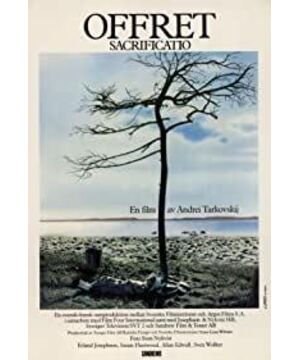Tarkovsky's near-desperate movie tree tree can be hope, just like the story Alexander told at the beginning of the movie, the tree has no roots but is planted there and watered every day, praying for it to come alive and bring people new hope and happiness. value. But this is impossible after all, the tree can only become the sustenance of Alexander's hope, and cannot save Alexander. The tree can also be a representative of the father figure, which is a common symbolism in many movies, reminiscent of the big tree at the end of "Landscape in the Fog". The life of the tree may have died, but its image can be immortal for many years. At the end of the movie, Alexander's son learned from his father to water the tree, and finally waded under the tree. The spirit of his father affected him, just like the one behind him. A big tree, the difference between this tree and the beginning of the movie obviously has a layer of meaning. In addition to hope, there is also the spirit or image of the father in it, which represents the power that the father gave to little Alexander-the movie said at this time It is the voice of Alexander, and it is also the voice of Tarkovsky - giving them hope and confidence. Water vapor does not know what role water played in Tarkovsky's life and growth. Tarkovsky's films reveal many unconscious manifestations of water imagery. In the wet wetlands in "Ivan's Childhood", little Ivan was sitting on an apple cart in a heavy rain in a dream, and the seaside horses were eating apples after the rain. The music and the heavy rain in the final room ended with a long shot; the rain in "Mirror", the washing of water and milk, and the wet ground; the wet swamps and rivers in "Nostalgia", the protagonist's depression Emotions seem to be pinned on these humidity. The damp grass and the depressed emotions of the protagonist in "Sacrifice" are very similar to those in "Nostalgia". The water or humidity does not have the dripping or melodious tone of the previous movies, but Breathless dampness - choking, worry or despair about the world around you. Just like the rainy season in southern China, the humid weather traps people in one place for a long time, triggering people's climatic dysfunction, resulting in strong depression. And the images of dampness and dim light in the film blend in perfectly with the repressed emotions. Fire fire is an image opposite to water. If water is the unconscious manifestation of depression, despair, or melancholy, then fire is the manifestation of the spiritual quest for redemption, an attempt to break through this extreme negativity. The fire in "Mirror" and the last self-immolation in "Nostalgia" all have these consciousnesses in them. The meaning of self-immolation in "Nostalgia" as redemption is more obvious, which can be said to express a similar meaning to the last fire of "Sacrifice" - spiritual salvation. Alexander Praying to God or supernatural power to save this real world full of terrible crises and struggles, Alexander even believed Otto's words and attempted to save this real world by union with his servant Maria. But when he wakes up (this makes it difficult to distinguish whether his union with Maria is a dream or reality, but it is certain that Alexander's spiritual world has changed), the stubborn reality is still there, and the almost desperate Alexander finally It took the way of a fire to make powerless resistance and self-salvation to the world. Maria films are often interspersed with paintings of the dynastic worship of the Virgin and Child from beginning to end. The religious meaning of this painting is the birth of Christ Jesus, which is the beginning of Christ's redemption of mankind. From this point of view, the painting reflects the meaning of redemption, and Alexander's servant Maria is precisely the name of the Virgin. Even so, the union of Alexander and Maria is still nothing, without Jesus, without any religious power or Alexander Looking forward to the appearance of the Holy Spirit, the cruel and terrifying reality continued to exist after Alexander woke up the next day. In Tarkovsky's view, it is possible that religious redemption is also like a pale dream, which cannot give human beings any redemptive power, or even bring comfort to human beings. When the fire finally broke out, Maria could only stand to the side blankly, looking at Alexander who was going crazy. What's going on in this world, what's going on? Neither Alexander nor Tarkovsky, who were sad and desperate, could give an answer. We could only continue to water the trees and continue to search. Tarkovsky's films are simple in narrative, but rich in meaning and multi-meaning. After watching them quietly, one can feel the depression, despair and hope in them. After all, the union of Alexander was nothing, without Jesus, without any religious power or the appearance of the Holy Spirit that Alexander expected, and the cruel and terrible reality continued to exist after Alexander woke up the next day. In Tarkovsky's view, it is possible that religious redemption is also like a pale dream, which cannot give human beings any redemptive power, or even bring comfort to human beings. When the fire finally broke out, Maria could only stand to the side blankly, looking at Alexander who was going crazy. What's going on in this world, what's going on? Neither Alexander nor Tarkovsky, who were sad and desperate, could give an answer. We could only continue to water the trees and continue to search. Tarkovsky's films are simple in narrative, but rich in meaning and multi-meaning. After watching them quietly, one can feel the depression, despair and hope in them. After all, the union of Alexander was nothing, without Jesus, without any religious power or the appearance of the Holy Spirit that Alexander expected, and the cruel and terrible reality continued to exist after Alexander woke up the next day. In Tarkovsky's view, it is possible that religious redemption is also like a pale dream, which cannot give human beings any redemptive power, or even bring comfort to human beings. When the fire finally broke out, Maria could only stand to the side blankly, looking at Alexander who was going crazy. What's going on in this world, what's going on? Neither Alexander nor Tarkovsky, who were sad and desperate, could give an answer. We could only continue to water the trees and continue to search. Tarkovsky's films are simple in narrative, but rich in meaning and multi-meaning. After watching them quietly, one can feel the depression, despair and hope in them.
View more about The Sacrifice reviews











